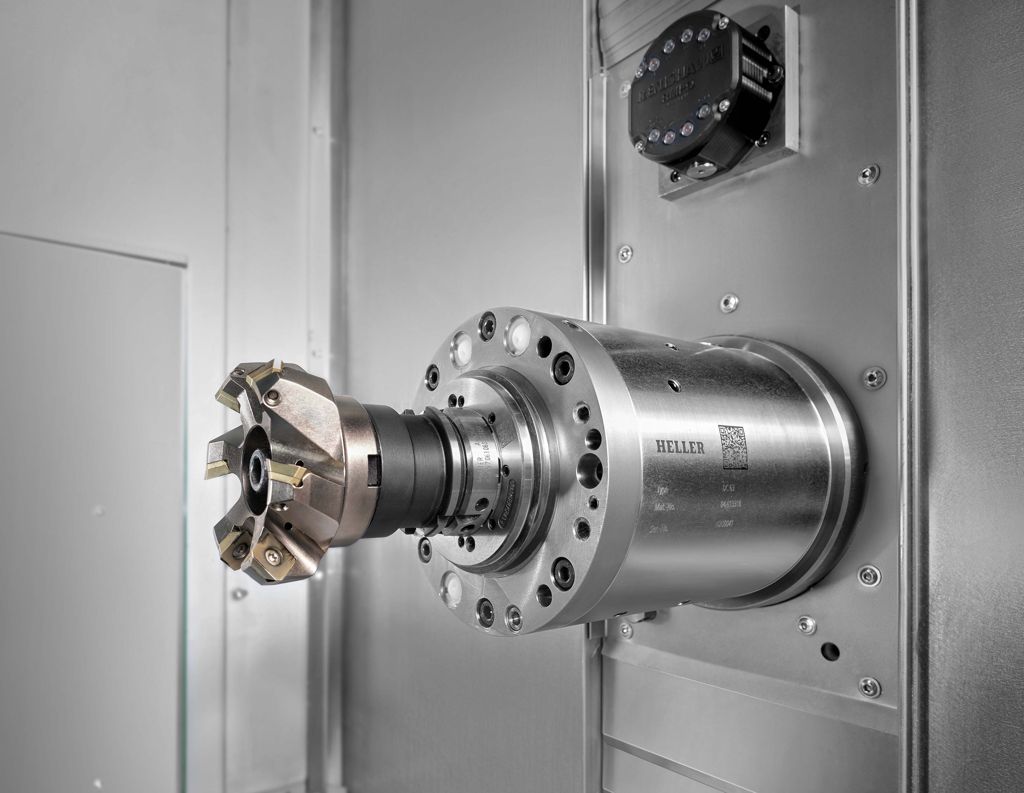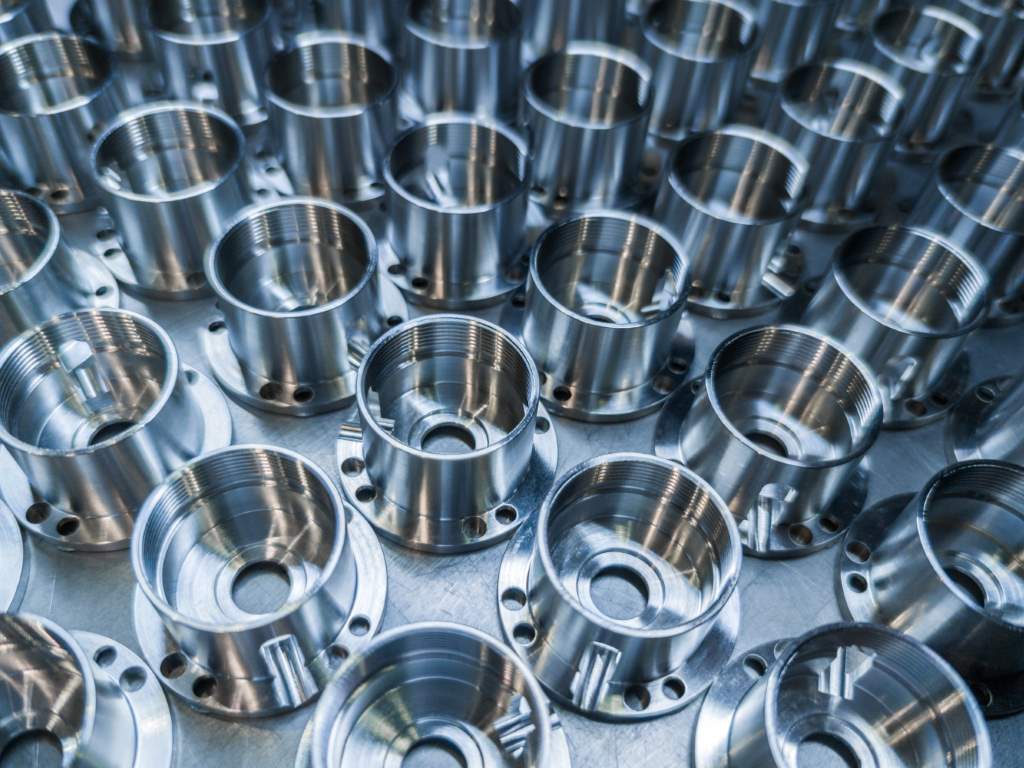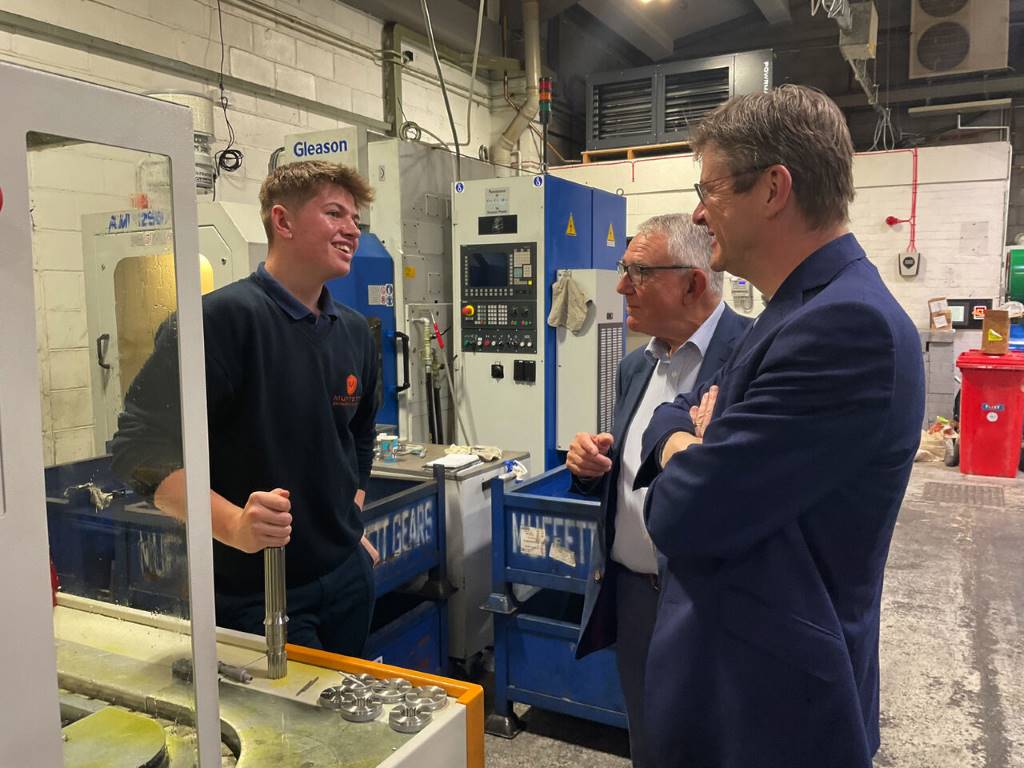Heller unveils next gen machines and performance tools

With its dual production flowlines and lean manufacturing methodologies ingrained indelibly into its DNA, Heller UK had more to lose than most having to deal with the double whammy of COVID-19 and Brexit. But despite the challenges, there’s much to look forward to in 2021 and beyond as Dave Tudor reports.
As a machine tool builder, Heller is a rare breed in the UK. Component parts are received from its European manufacturing facilities and then assembled at its state-of-the-art production plant in Redditch. Once complete, machines are shipped out ready to run to customers in the UK, mainland Europe and the wider world. It’s an interesting fact that components used for Heller machines are manufactured almost exclusively on Heller machines.
It’s a hive of activity at Redditch – components in; machines out; container lorries in; container lorries out. Currently the facility is producing around four machines a week. Dual production flowlines are the heartbeat of the Heller UK operation so you don’t need me to tell you that continuity of supply is paramount here.
Like millions of businesses worldwide, Heller was affected by COVID-19, but in the face of adversity, the company remained open for business: “Overall, like many capital equipment suppliers, we saw a marked drop in demand,” recalls Heller UK’s managing director, Matthias Meyer, “but I’m proud to say that this facility has maintained production throughout the entire pandemic.”
Based on the fact that it’s pretty difficult to build a machine tool in someone’s garden shed, home working wasn’t an option for many of Heller’s 160 employees but Matthias Meyer maintained a working equilibrium through the furlough scheme.
“Personally, I believe that interaction between employees is vitally important in a working environment like ours so we tried to encourage that as much as possible while adhering to social distancing directives,” he says. “So, on the shopfloor we introduced a double shift rota arrangement but with reduced hours so staff could still work with their colleagues in a safe environment.
“Most of our people were partially furloughed so a rota system worked really well. We were also able to accommodate those that preferred to be fully furloughed because of personal circumstances and that was fine too. Also, it’s important to be fair. Some roles can be done from home but some cannot, so it’s important to adopt a balanced approach.”

Mr Meyer certainly went the extra mile for his employees during the pandemic. The psychological effects of being in lockdown are well documented so he organised regular Zoom call briefings for those at home to keep them informed of developments. Time was also set aside for furloughed or shielding staff to interact with their work colleagues via Zoom.
Core competence components
Before and indeed during the pandemic, Mr Meyer saw some key customers re-focusing their objectives in the quest for ever greater machining productivity, optimisation and efficiency – predominantly with the manufacture of core competence parts. A case in point is Mettis Aerospace.
“What we’re seeing is customers investing in their manufacturing processes to enable them to produce more in-house in the most efficient way possible,” he explains. “Mettis is a good example: the company is now machining pylons for a global aircraft manufacturer from start to finish at its facility in Redditch – and to facilitate this, in terms of reliability, precision, efficiency, minimising cycle times and sustainability, the business has invested significantly in Heller machines before and during the pandemic.”
Heller’s key account manager, Peter Schaefer, takes up the story: “In-house titanium machining is a big focus for Mettis and this of course is something that Heller machines are renowned for globally.
“We provided a turnkey solution centred around an automated manufacturing cell. We conducted successful machining trials at our facility in Germany and worked closely with Seco Tools on the tooling side. Mettis is using H6000 horizontal machining centres for roughing operations and HF5500 5-axis machines for finishing. Currently they have six Heller machines in their Redditch factory with a further three on order,” he explains.
Another high-profile Heller customer that has focused on optimising its in-house machining capabilities is Perkins, famous of course for its expertise in producing high quality diesel engines: “Similar to Mettis, Perkins has invested in three Heller H5000 HMCs for roughing and three HF5500 5-axis machines for finishing,” Mr Schaefer adds.
“For both companies however, automation is paramount both for lights-out machining and to enable a wide variety of parts to be processed in the most efficient way possible, so Fastems automation systems have been incorporated. This allows for the storage of different fixtures and pallet loading options for example within the cell itself for multi-component processing – start to finish. It’s all about keeping the spindles turning at all times.”
“In both of these turnkey projects, Heller has effectively acted as a systems integrator, pulling in the necessary expertise where required to make sure we deliver the right solution for the customer,” Mr Meyer affirms.
“Many of our customers are looking at the big picture, not just the cost of the machine tool, and that’s so important – evaluating the true cost per part taking everything into consideration – accuracy, speed, reliability and sustainability. With the Mettis project, our process was 35% faster on the total machining time for an assembly of titanium components than other machine tool manufacturers that tendered for the work.
“And more and more, our customers are requesting ‘Smart’ integrated solutions – typically comprising machines, automation, software and digitisation. At Heller, we take care of the entire project from start to finish.”
Next generation technology
In a year blighted by the effects of COVID-19 good news is always welcome and in Heller’s case it’s the fact that the company has introduced a fourth generation of H-Series 4-axis, twin pallet HMCs and a second generation of HF series 5-axis machines.
Even better is the news that the four smaller models in the H Series – H2000, H4000, H5000 and H6000 – as well as second generation HF3500 and HF5500 machines will be assembled in Redditch.

According to Peter Schaefer, standout features across both ranges of new generation H and HF machines comprise an optimised tool change sequence which results in a significant reduction in chip-to-chip times, and an entirely new family of Heller designed and built spindles. A further notable development is that the six new spindles are interchangeable between H and HF machines.
“Often, following a collision or crash, it’s the front end of the spindle that gets damaged,” Mr Schaefer states. “Our Zero Spindle System means that just the front section can be changed which keeps downtime to a minimum. In fact, the customer can be up and running again within two hours. Not only that, spindle parts are available ex-stock.”
With the new H machines, users can also expect to see more stability in the upper stroke positions due to improvements made in the rotary table and linear axes. A new graphical user interface (GUI) has also been introduced for the Fanuc control option. Visually, the new generations of both H and HF machines look aesthetically similar.
Productivity packages
Heller hasn’t only been busy designing and manufacturing new generations of machine tools, it has also developed a new website landing page (www.heller.biz/performance/en) under the slogan ‘Be a Performer’ which aims to guide and help users select the correct machine (and optional extras) for their individual needs. It not only deals with the machine itself, but also covers other essential elements like automation and digitisation.
It’s called Performance Check, and once you’ve entered your contact information the tool asks a series of specific questions about your needs and requirements. It’s user friendly, highly intuitive and once the results are in, Heller will get in touch to discuss things in greater detail.
“Performance Check is designed to be a top-level tool to make suggestions to users regarding their specific requirements, but it also aims to offer a much more holistic view, making people aware of the technology that’s available to optimise their production processes from Heller,” Mr Meyer explains.
“For the user, it goes beyond the machine tool itself: have you considered automation? What about digitisation? Have you thought about maintenance and service packages or even finance? We’re encouraging people to look at the bigger picture and consider the total cost of ownership. The machine tool is only part of the equation.”
The new landing page completes the circle by offering details on a comprehensive range of Performance Packages available to Heller customers. For users with specific needs, the price of a package is often far more cost-effective than the sum of its individual parts.
Broadly the packages comprise: Equipment, Financing, Digitisation and Services with extensive options in each covering everything from high-speed machining, the provision of measuring probes, coolant temperature control and tool breakage monitoring, through to lease or buy finance options, remote diagnostics and maintenance/service agreements.
In this data driven world, more digitisation inevitably means more processing power is required. Traditionally, on machine tools, all processing tasks were handled by the PLC but this sometimes resulted in overloading which could affect machine performance significantly.
Now, to combat the data deluge and lighten the load, Heller machine tools are fitted with an integral Siemens Edge Box which is a small, standalone high performance industrial PC designed to handle all data storage and processing tasks.
Heller ‘Be a Performer’ www.heller.biz/performance/en
Heller www.heller.biz













